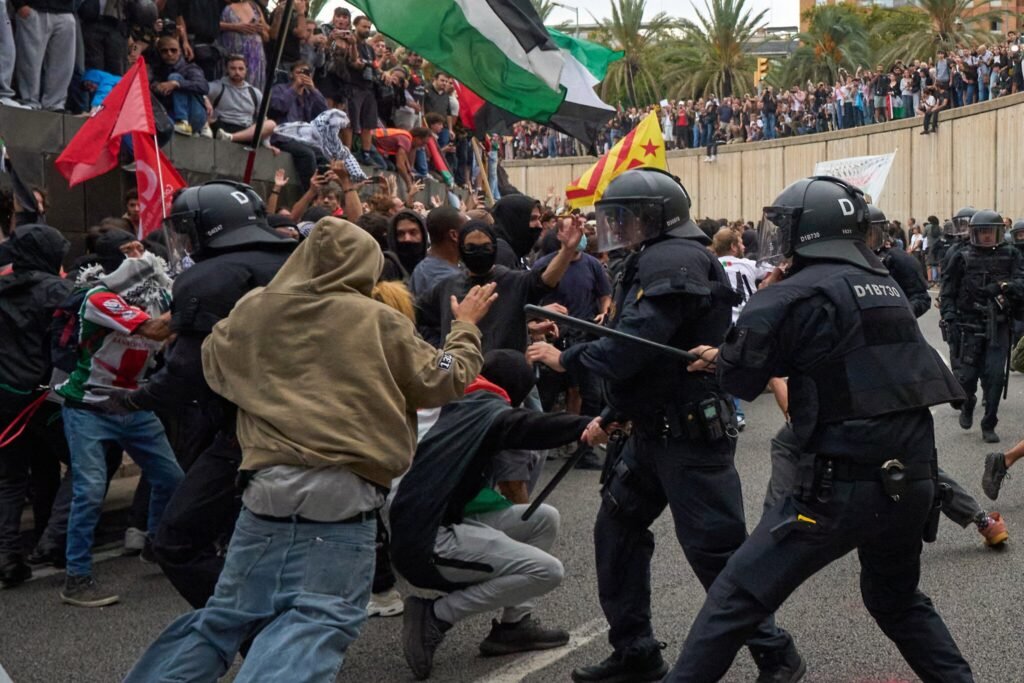Global Outcry: Israel’s Interception of Activist Flotilla Sparks Protests Worldwide
A significant international backlash has erupted following Israel’s interception of an activist flotilla attempting to breach the naval blockade of Gaza, aimed at delivering humanitarian aid. Over 400 activists were detained while sailing on 41 boats, marking one of the largest flotillas this year. The Israeli military reported that the operation was conducted without causing any injuries to the activists, who were declared "safe and healthy" during the detainment process.
Activist Flotilla Objectives
The flotilla, comprised mainly of pro-Palestinian activists bringing symbolic quantities of humanitarian aid, had been navigating toward Gaza for several weeks. Despite Israel’s offer to allow the activists to dock in its territory, with assurances that the aid would be transferred to Gaza, the protesters opted to defy this route, seeking instead to reach Gaza directly. The Israeli government classified such attempts as “stunts” and “provocations” aimed at challenging its blockade, which it enforces to prevent Hamas from importing weapons.
Global Protests Erupt
In the wake of the flotilla’s interception, demonstrations erupted across numerous cities worldwide, including Dublin, Paris, Berlin, Geneva, Buenos Aires, Mexico City, and Karachi. Protesters expressed their anger through blocking traffic and vandalizing businesses, which sparked controversial discussions about the effectiveness of such actions. Notably, many were critical of the methods employed, arguing that peaceful advocacy would be more beneficial to the Palestinian cause.
In Spain, students held protests, blocking access to universities and major thoroughfares, while Italian unions announced plans for a general strike in support of the flotilla. Activists in Turkey took to the streets in large numbers, displaying banners denouncing Israel’s actions as “terrorism,” while protests in Istanbul highlighted calls for solidarity with the Palestinian people.
Diplomatic Fallout: Colombia and Other Nations Respond
The diplomatic ramifications were immediate and severe. Colombia took Monday’s events seriously, expelling all remaining Israeli diplomats and canceling a significant trade deal. President Gustavo Petro labeled the interception as a "new international crime" perpetrated by Israeli Prime Minister Benjamin Netanyahu.
Meanwhile, other nations echoed similar sentiments. Turkey and South Africa condemned the interception, calling for the immediate release of detained activists. Turkish officials characterized the action as an act that threatens the safety of civilians and violates international law.
Mixed Reactions from Italy and Reconnections with the Past
Interestingly, some voices in Italy, including Prime Minister Giorgia Meloni, criticized the flotilla’s intentions. She stated that the activists “bring no benefit to the Palestinian people” and urged them to halt their efforts. This position, however, stood in stark contrast to the broader sentiment among Italians advocating for the activists’ return and voicing solidarity with Palestinians.
Humanitarian Crisis in Gaza
The context of these events is grounded in the humanitarian crisis precipitated by the ongoing war in Gaza against Hamas, which began on October 7, 2023. The violence has resulted in significant casualties, with reports estimating over 66,000 deaths in the Strip, as stated by the Hamas-run health ministry. The humanitarian situation continues to deteriorate, with many displaced and in dire need of assistance.
Calls for International Action and Legal Consequences
Various international bodies have voiced concerns regarding the legality of Israel’s actions, including the United Nations Human Rights Office, which emphasizes that as an occupying power, Israel is obliged to facilitate humanitarian aid to the region. Furthermore, the British Foreign Office expressed deep concern over the situation, urging that the aid intended for the residents of Gaza be promptly rerouted to humanitarian organizations.
Conclusion: The Need for Collaborative Solutions
This recent incident underscores the complex interplay of geopolitics, humanitarian imperatives, and activism in the ongoing Israeli-Palestinian conflict. As protests continue globally, the need for dialogue and effective mediation becomes increasingly vital. Advocates argue that peaceful efforts, grounded in solidarity and dialogue, might pave the way for a more sustainable resolution to the enduring crises affecting both Palestinians and Israelis.
For more on this story, you can visit news outlets like The Times of Israel and The Guardian or monitor live updates from various international news platforms.


